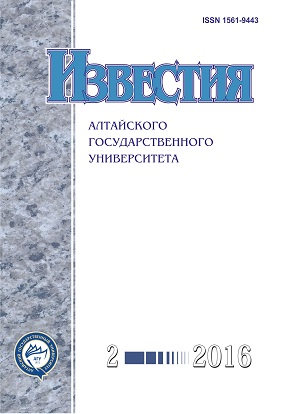The Establishment of the Department of Control and Cash Register of the Ministry of the Imperial Court in Barnaul and the Beginning of the Crisis at the Altai Mining Plants
Abstract
The article considers the reasons for the establishing in Barnaul of the Department of Control and Cash Register of the Ministry of the Imperial Court in 1871. The institution can be viewed as a reform in the framework of distribution in the Ministry of the Court of the principles of unity of cash register and documentary control. The author reveals the preconditions of the new cash registering principles at the mining factories of the Cabinet of his Emperor Majesty. The author argues that the proliferation of reforms over the Altai mining plants was a result of their crisis. The main content of the article clearly shows that the establishing of the Department of Control and Cash Register reflected the opposition between the Minister of the Imperial Court and the Cabinet. The anti-cabinet subtext was hidden due to the implementation of the reform along with other anti-crisis measures of the Ministry. According to the author, the new Department and its activities allowed the Minister of the Imperial Court to control the administration of the Altai mining bypassing the Cabinet. The author comes to the conclusion that rush, administrative bias and superficiality of the reform originally resulted in most of the shortcomings and difficulties in the subsequent work of the Department of Control and Cash Register.
DOI 10.14258/izvasu(2016)2-02
Downloads
Metrics
References
Соболева Т.Н. Участие Министерства финансов и других финансово-хозяйственных структур в становлении и развитии кабинетского хозяйства на юго-востоке Западной Сибири // Финансы Алтая. 1747–2002. — Барнаул, 2002.
Соболева Т.Н., Осипова М.А. Алтайская бюрократия 60‑х — начала 80‑х гг. XIX в. (Негативные штрихи к портрету кабинетской горнозаводской администрации) // Население, управление, экономика, культурная жизнь Сибири XVII — начала XX в. — Барнаул, 2003.
Ведерников В.В. Горные инженеры на Алтае в 1747– 1896 гг. —Барнаул, 2005.
Афанасьев П.А. Ревизионный контроль в кабинетском хозяйстве Западной Сибири в XIX — начале XX в. — Барнаул, 2014.
Коняев А.И. Финансовый контроль в дореволюционной России. — М., 1959.
Полное собрание законов Российской империи. Собрание 2‑е. (ПСЗРИ-2). — Т. 41. — Отд. 1. — №42861.
Собченко Е.Н. Реформа системы государственной отчетности и образование Контрольных палат в 60‑х гг. XIX века // Вестник Новгород. гос. ун-та. — 2007. — №41.
Российский государственный исторический архив (РГИА). — Ф. 482. — Оп. 2 (765/1941). — Д. 406.
РГИА. — Ф. 468. — Оп. 21. — Д. 1081.
ПСЗРИ-2. — Т. 42. — Отд. 2. — №44414.
Кривенко В.С. В Министерстве двора. Воспоминания. — СПб., 2006.
РГИА. — Ф. 482. — Оп. 2 (765/1941). — Д. 43.
Государственный архив Алтайского края. — Ф. 2. — Оп. 1. — Д. 1630.
РГИА. — Ф. 482. — Оп. 2 (765/1941). — Д. 241.
Izvestiya of Altai State University is a golden publisher, as we allow self-archiving, but most importantly we are fully transparent about your rights.
Authors may present and discuss their findings ahead of publication: at biological or scientific conferences, on preprint servers, in public databases, and in blogs, wikis, tweets, and other informal communication channels.
Izvestiya of Altai State University allows authors to deposit manuscripts (currently under review or those for intended submission to Izvestiya of Altai State University) in non-commercial, pre-print servers such as ArXiv.
Authors who publish with this journal agree to the following terms:
- Authors retain copyright and grant the journal right of first publication with the work simultaneously licensed under a Creative Commons Attribution License (CC BY 4.0) that allows others to share the work with an acknowledgement of the work's authorship and initial publication in this journal.
- Authors are able to enter into separate, additional contractual arrangements for the non-exclusive distribution of the journal's published version of the work (e.g., post it to an institutional repository or publish it in a book), with an acknowledgement of its initial publication in this journal.
- Authors are permitted and encouraged to post their work online (e.g., in institutional repositories or on their website) prior to and during the submission process, as it can lead to productive exchanges, as well as earlier and greater citation of published work (See The Effect of Open Access).








